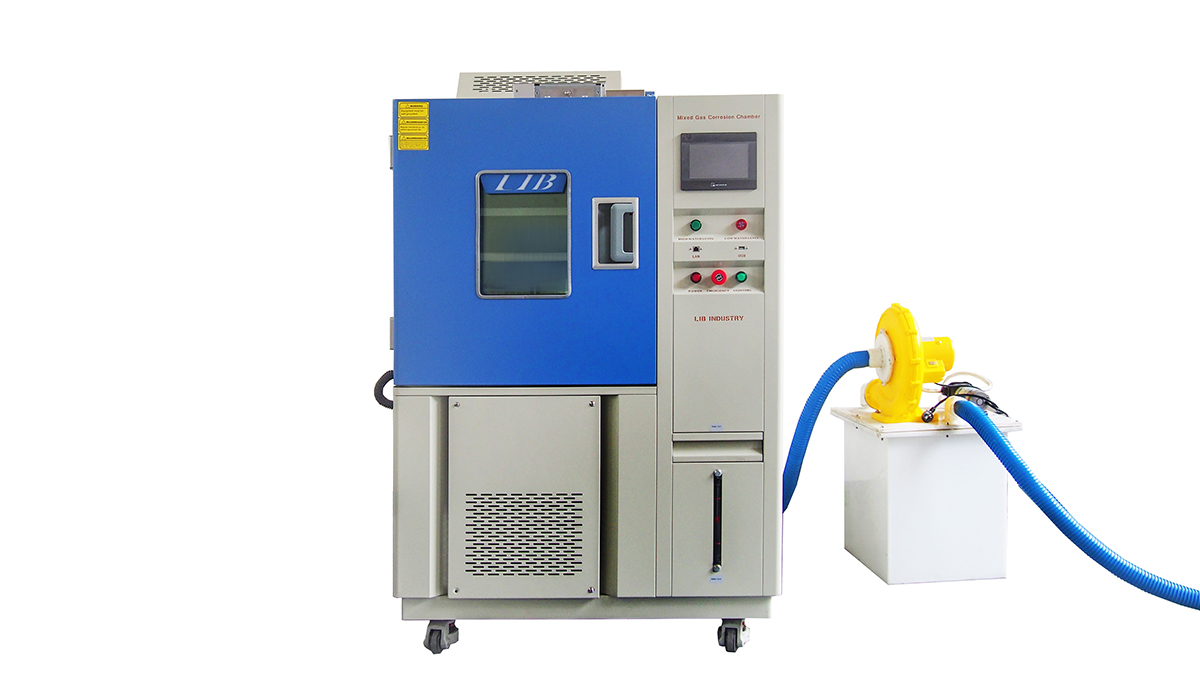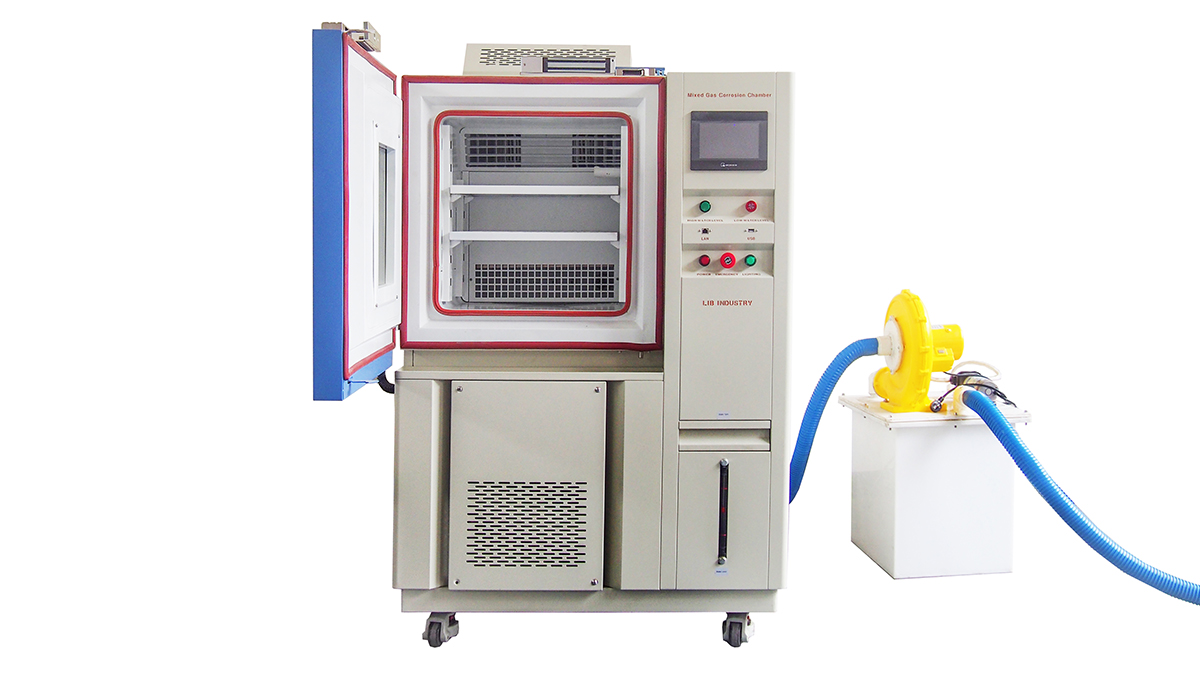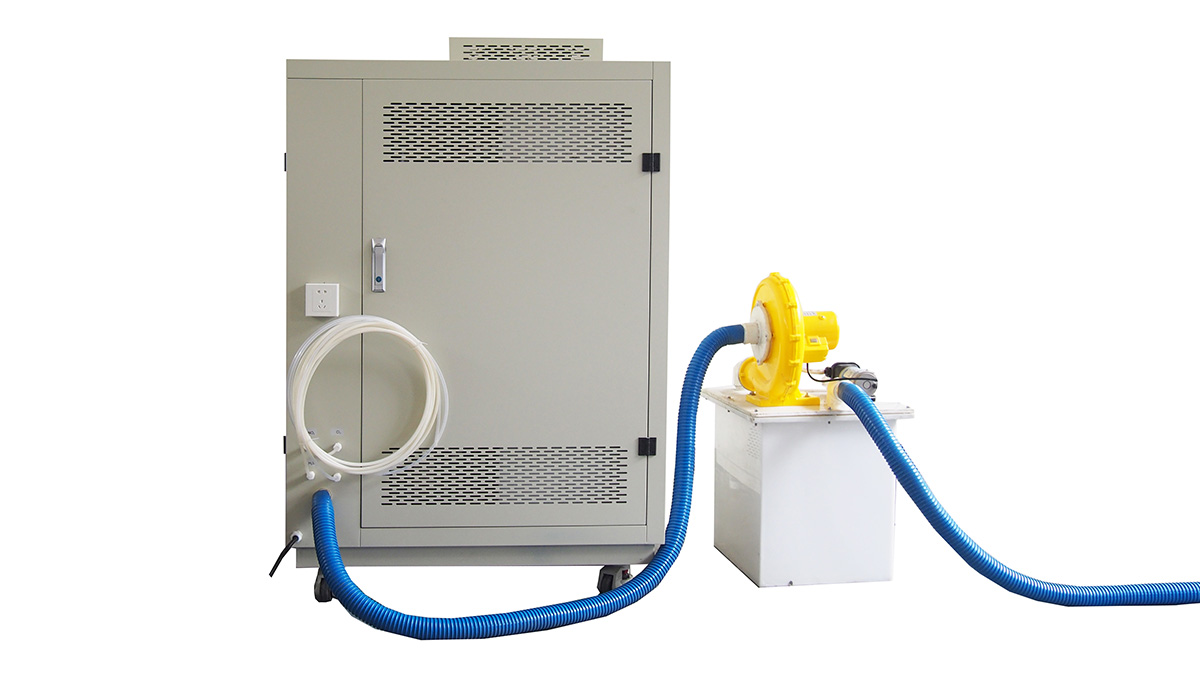The noxious gas test chamber mainly prepares SO2 gas in a specific way and introduces it into the test chamber studio. At the same time, the environmental conditions in the chamber are precisely controlled to simulate different use environments and accelerate the corrosion process, so as to test the SO2 corrosion resistance of materials or products.The noxious gas test chamber mentioned in this paper mainly refers to the SO2 test chamber.

First of all, the noxious gas test chamber adopts a special SO2 cylinder and transmits a certain amount of SO2 gas to the test chamber with the help of a gas flow control device, and the corrosion-resistant material is used to ensure the stable and accurate transmission of gas without composition change or leakage.
In terms of environmental condition control, on the one hand, the temperature in the chamber can be accurately adjusted through the heater and temperature control system, which can be set within a certain range from room temperature to higher temperature. Different temperatures simulate different use environments or accelerate corrosion, because the temperature rise usually accelerates the chemical reaction rate, making the corrosion effect of SO2 on materials more obvious; On the other hand, humidity control is also very important, through the humidification device and humidity control system to adjust the humidity inside the chamber, high humidity environment SO2 is easy to form acidic solution, accelerate the corrosion of materials. In addition, there may be a gas circulation system to ensure that SO2 gas is evenly distributed in the test chamber, so that all parts of the material or product can be fully exposed to SO2, to ensure the accuracy and reliability of the test results, and these functions work together.The application fields of noxious gas test chamber mainly include the following aspects:

1. Materials Science Research
- Material corrosion resistance research: Help researchers understand the corrosion behavior and mechanism of different materials under SO2 environment, such as the corrosion rate and corrosion form changes of metal materials (such as steel, aluminum, copper, etc.), alloy materials, coating materials, plastics, rubber, etc., under the action of SO2, so as to provide theoretical basis for the development, improvement and selection of materials. For example, the protective effect of new anti-corrosion coatings in SO2 environments is studied to develop materials that are more suitable for high-sulfur environments.
Material performance evaluation: evaluate the physical and mechanical properties of the material after corrosion by SO2, such as the change of strength, hardness, toughness, ductility and other indicators, to determine whether the material meets the requirements of use in a specific environment.

2. Environmental protection
Environmental protection materials assessment: used to evaluate the durability and corrosion resistance of various environmental protection materials in the environment polluted by SO2, to provide a basis for the formulation and implementation of environmental protection policies. For example, testing the stability and service life of adsorption materials and purification materials used for waste gas treatment in sulfur-containing environments to ensure the effectiveness and reliability of environmental protection measures.
Air pollution simulation research: simulate SO2 pollution in the atmosphere, study the impact of SO2 on the environment and the migration and transformation law of pollutants, and provide data support and theoretical basis for air pollution prevention and control.
3. Industrial production field
Petrochemical industry: The petrochemical production process will come into contact with raw materials such as crude oil and natural gas containing sulfur, and many equipment and pipelines are in a sulfur-containing environment for a long time. The noxious gas test chamber can be used to test the corrosion resistance of equipment materials (such as valves, pipelines, storage tanks, etc.) and anti-corrosion coatings, providing guidance for the selection, design and maintenance of equipment to ensure the safety and stability of production.
Power industry: In the process of thermal power generation, the combustion of coal and other fuels will produce harmful gases such as SO2, and the metal parts of power generation equipment are prone to corrosion by SO2. The reliability and service life of power equipment in sulfur-containing environment can be evaluated by testing the material and protective layer of power equipment through noxious gas test chamber, so as to ensure the normal operation of power system.
Metallurgical industry: Some metallurgical processes produce sulfur-containing waste gas, and related equipment and materials need to have good resistance to sulfur corrosion. For example, in the process of copper smelting and zinc smelting, the SO2 test chamber is used to carry out corrosion tests on the parts of the equipment and the protective layer of metal materials, so as to select the appropriate materials and protective measures to improve production efficiency and the service life of the equipment.
Automotive industry: Automotive components may be exposed to sulfur-containing environments during use, such as SO2 in exhaust emissions. The noxious gas test chamber can be used to test the sulfur corrosion resistance of automotive components (such as engine components, exhaust systems, body coatings, etc.), providing a basis for automotive design, manufacturing and quality control.
4. Electronic industry
Electronic components and electronic products may be affected by SO2 during production, storage and use. The noxious gas test chamber can simulate the SO2 environment of different concentrations and temperatures, test the corrosion resistance of the packaging materials of electronic components, the protective coating of the circuit board, etc., to ensure the quality and reliability of electronic products.
5. Product quality testing and certification: All kinds of products need to be tested and certified before they are put into the market to ensure that they meet the relevant standards and requirements. The noxious gas test chamber can be used to test the SO2 corrosion resistance of the product, determine whether the product can be used normally in a sulfur-containing environment, and provide a scientific basis for product quality testing and certification.